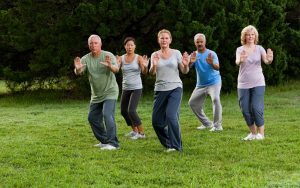Improve Physical Ability, Balance, and Flexibility with Tai Chi
By John M. de Castro, Ph.D.
“Tai Chi is a relatively safe activity that can result in gains in general motor function and improve bradykinesia and balance. “ – Xiny Yu
Tai Chi is an ancient Chinese practice involving mindfulness and gentle movements. It is easy to learn, safe, and gentle. Tai Chi has been practiced for thousands of years with benefits for health and longevity. Tai Chi training is designed to enhance function and regulate the activities of the body through controlled breathing, mindful concentration, and gentle movements. Only recently though have the physical and motor effects of this practice been scrutinized with empirical research. The findings have been accumulating. So, it makes sense to summarize what has been learned.
In today’s Research News article “Effect of Tai Chi on muscle strength, physical endurance, postural balance and flexibility: a systematic review and meta-analysis.” (See summary below or view the full text of the study at: https://www.ncbi.nlm.nih.gov/pmc/articles/PMC7871341/ ) Wehner and colleagues review, summarize and perform a meta-analysis of the published research findings from randomized controlled trials (RCTs) of the effects of Tai Chi training on physical ability, strength, balance, and flexibility. They identified 31 published randomized controlled trials that included mostly participants over 60 years of age.
They report that the published research found that Tai Chi practice produce a significant increase in hand grip strength, timed walking distance, postural balance, and spine flexibility. These findings suggest that engaging in Tai Chi practice results in improved health-related fitness. This is particularly important for aging individuals where physical decline is inevitable and suggests an increased health-related quality of life. The improvements in balance are important as they signal a decreased likelihood of falls which are very dangerous for the elderly.
So, improve physical ability, balance, and flexibility with Tai Chi.
“our main finding suggests a statistically significant general improvement in motor efficiency for the TC group.” – Luisa Sartori
CMCS – Center for Mindfulness and Contemplative Studies
This and other Contemplative Studies posts are available on Twitter @MindfulResearch
Study Summary
Wehner, C., Blank, C., Arvandi, M., Wehner, C., & Schobersberger, W. (2021). Effect of Tai Chi on muscle strength, physical endurance, postural balance and flexibility: a systematic review and meta-analysis. BMJ open sport & exercise medicine, 7(1), e000817. https://doi.org/10.1136/bmjsem-2020-000817
What is already known?
- Tai Chi training has positive effects on a variety of chronic diseases (eg, osteoarthritis) and health-related issues (eg, reduced risk of falling).
- Tai Chi training exerts a positive impact not only on physical parameters, but also on mental health.
- There is good evidence for positive effects of Tai Chi training for older people and patient populations, as most previous studies concentrated on these populations.
What are the new findings?
- There is evidence that Tai Chi training can also moderately improve physical fitness as measured by tests commonly applied in health-related fitness or competitive sports contexts; for healthy people such tests are more relevant compared with the clinical assessment tools used for unfit and patient populations. Improvements were observed in handgrip strength, functional capacity, postural balance and thoracolumbar flexibility.
- We hypothesise that not only slow motions of the legs and kicking movements while standing on one leg, which are characteristic in Tai Chi but also the improvement of thoracolumbar flexibility enhance postural balance.
Abstract
Objective
To investigate the impact of Tai Chi training on muscle strength, physical endurance, postural balance and flexibility, as measured by tests commonly used in health-related fitness or competitive sports contexts.
Design
Systematic review and meta-analysis.
Data sources
The following databases were searched up to 31 July 2020: CINAHL, Cochrane Library, MEDLINE via PubMed and SPORTDiscus.
Eligibility criteria for studies
Inclusion: (1) Randomised controlled trials published in German or English; (2) Tai Chi used as an intervention to improve physical performance; (3) Test methods commonly used in health-related fitness or competitive sports and (4) Participants aged ≥16 years (irrespective of health status). Exclusion: (1) Studies not focusing on Tai Chi or including Tai Chi mixed with other interventions and (2) Modified or less than eight Tai Chi movements.
Results
Out of 3817 records, 31 studies were included in the review, 21 of them in the meta-analysis. Significant improvements in handgrip strength (2.34 kg, 95% CI 1.53 to 3.14), walking distance during 6 min (43.37 m, 95% CI 29.12 to 57.63), standing time in single-leg-stance with open eyes (6.41 s, 95% CI 4.58 to 8.24) and thoracolumbar spine flexibility (2.33 cm, 95% CI 0.11 to 4.55) were observed.
Conclusion
Tai Chi training seems to moderately improve physical fitness when evaluated by tests used in health-related fitness or competitive sports. Moreover, thoracolumbar spine flexibility seems to be a factor in the improvement of postural balance. Further research is needed, including younger healthy participants performing a widely used, standardised form (eg, Peking-style routine) with high-intensity movements (eg, use of lower stances).
https://www.ncbi.nlm.nih.gov/pmc/articles/PMC7871341/
